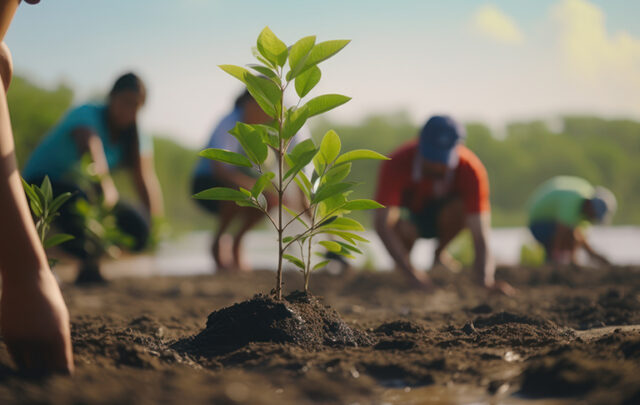It’s a bit of a challenge, to imagine what Earth Day will look like in ten years. Part of that challenge arises from the fact that it depends on what we do throughout that decade to deal with and try to correct the ravages of incipient climate change effects. Perhaps I should approach it thus.
First of all, regardless of what we do to offset these shifting trends, the oceans will continue to rise and ice will still melt at the poles, in Greenland, the Himalayas, Andes, Alps and elsewhere. We have already set things in motion that won’t be reversed or restored for thousands of years. Just bringing back icecaps and glaciers alone will take millennia, just like their time for creation. We have squandered an irreplaceable asset that we took for granted, not knowing it was at stake.
Second, there are things we can do to reverse these tides of change on the ground. We need to cover the planet in greenery and restore our soils to full health. This calls for changing our ways of fertilization and corporate agribusiness, which have alienated us from the flowering source of fruitful largesse from an earth grown by Nature. We must come to understand our environment in all its urgent demands on us to engage with it through alliance and not in adversarial combat. This is a war in which we will all lose the bounties by which we are borne. We need to open our eyes.
Third, if we do nothing, our fate is unknown and worthy of fear. The threat descending upon us is simply unfathomable in its fury. We have only just started to see our results in large storms and destructive fires that are placing our seashores and forests at risk – along with our very lives. We are like children playing with matches, clueless on the effects set in motion by our heedless proclivities. Do we know and not care? Or is ours an ignorance with no excuse or apology for the blindness? In any event, we set things in motion with every action we take, consequential or not.
The problem with thought – even when it transpires – stands on its selectivity; we cannot see anything we ignore, whether related or not. Theory is blind in its exclusive focus on matters seen as important, too silent on all left out, twined within self-asserted essentials. Our only protection against amaurosis is an open mind devoted to learning above all else. From such a vantage, those who differ remain our best opportunity to transcend our pitiful, limited understanding, and so to embrace someone else’s experiences as our own through sharing. These intimate exchanges in knowledge and of formative moments stretch awareness beyond the personal realm into a wider panorama of viable learning and truth. So are released insights secured by a self-contained view.
We share information to open ourselves anew and to celebrate the connectedness of all life in our realm. Meaning emerges, surprisingly and beyond any preconception, when we join to each other in knowledge and truth. Indeed, this celebration elevates spirit and understanding outside of its sere residual loneness into a joyous circle of friends. So will learning create new experiences.
This is our conjugate mission, to frame meaningful ways to undo ecological losses and to heal our ravaged planet. The route to that end is to rid ourselves of our cultural lessons so well imprinted upon us that this will take time and effort to unfold truthful lessons out of fiction and dreams. We have gathered together in an ambitiously urgent task calling us to expand our awareness into new realms of vital living creatures beyond just human species. So we will learn to embrace all life.
Please engage with us in this quest. We can do this by working together, in a full chorus of joy.





